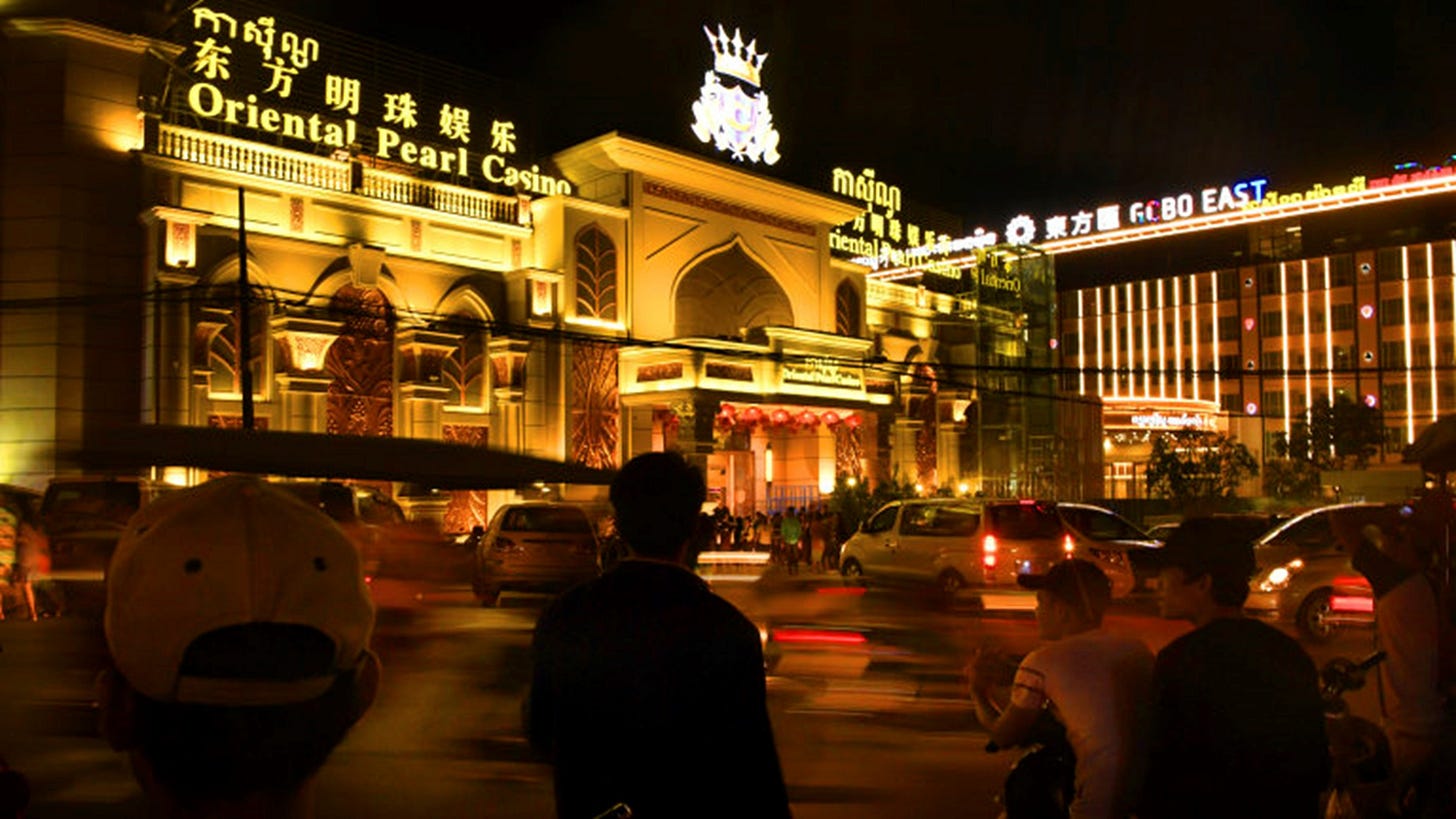If plans go as forecast, Thailand over the next few weeks will leap headlong into the world of international gaming, with plans to authorize massive “entertainment complexes” in Bangkok, Phuket, Chiang Mai, and Pattaya in a bid to lure punters expected to boost the country’s already formidable tourism revenue by US$12 billion annually. But, as Cambodia, the Philippines, Myanmar, Saipan, and other gambling meccas have learned, and as the cliché goes, be careful what you wish for.
The country is already an impressive tourism powerhouse with 40 million visitors expected in 2025. In 2023, Bangkok overtook Paris as the world's most-visited city, with foreign tourism accounting for 18 percent of GDP and driving much of the country’s economic growth, which had stagnated under a decade of military rule. According to the World Bank, “the growth prospects from the export-led model that not long ago powered so much of Thailand’s economic growth seem to have diminished significantly, owing to a stagnation in productivity.” Private investment declined from more than 40 percent to 16.9 percent of GDP in 2019, while foreign direct investment flows and participation in global value chains stagnated.
Earlier this year, government leaders throughout the region seeking to emulate Singapore’s success in mixing gaming with entertainment salivated with jealousy over the lure of megastar Taylor Swift, whose Eras Tour included six sold-out concerts in Singapore from March 2 to 9, and which are believed to have earned the Lion City’s businesses an estimated US$260 million to US$375 million in tourism receipts – enough to turn any finance minister’s head.
Accordingly, the ambition to increase visitor arrivals under the government, now led by Thaksin Shinawatra’s Pheu Thai coalition, is regarded as a magic potion. The Rolling Stones, still led by Mick Jagger and Keith Richards, are still grossing more than US$8.5 million per night. Already the US-based MGM Resorts and Las Vegas Sands and Galaxy Entertainment Group of Macau have declared interest in the Thai market. Prime Minister Srettha Thavisin is seeking to supercharge visitor arrivals primarily via a flood of Chinese tourists to facilities that would include amusement parks and other facilities known as MICE, an acronym for meetings, incentives, conferences, and exhibitions to add to the country’s louche reputation as one of the world’s premier sex tourism destinations.
A detailed draft of the proposed casino law was released last week by the government’s council of state, an advisory department under the prime minister’s office to provide guidance to state entities. Proposed legislation is expected to go to the Cabinet for approval, then would go for debate and amendment in Parliament, with passage likely.
Under its provisions, the draft is designed to follow the so-called “Singapore model,” with up to five licenses for these integrated entertainment complexes to include large resorts with convention and entertainment operations to provide sidebar. Singapore’s Marina Bay Sands, for example, maintains a heavy focus on conventions and high-end restaurants, while the companion Resorts World Sentosa provides a more family-friendly draw with its Universal theme park. The draft allows for 30-year licenses with 10-year extensions to operators who would pay a 17 percent tax on gross gaming revenue, a key metric representing the difference between the amount wagered minus the amount won.
But gaming and its corollary entertainment sidebars, unless it is carefully controlled as in Singapore, can turn into a nightmare, as it did in Sihanoukville, a once-sleepy city on Cambodia’s southern coast, which was transformed into a tawdry nightmare with the arrival of up to 300,000 Chinese nationals including such figures as the notorious Wan Kuok-koi, known as Broken Tooth Koi, the leader of Macau’s notorious 14K triad. Scams such as “fattening pigs” thrived. Murder and kidnapping rates skyrocketed. Chinese investment poured into casinos, hotels, and real estate across the country until then Prime Minister Hun Sen in 2019 banned online gambling and forced all related businesses to close by the end of the year, supported by an enraged Chinese leader Xi Jinping. At least 6,000 left every day after Hun Sen announced the ban, with at least 150,000 departing.
The story has been similar in Myanmar, the Philippines, and just about everywhere that embraced large-scale gaming, with Xi Jinping denouncing criminal activity related to gaming. Amid rising criminal activity and illicit financial flows, “Southeast Asia’s booming online gambling sector has resulted in economic and political losses for the member states of the Association of Southeast Asian Nations,” wrote Amelie De Leon, a research intern with the Southeast Asia Program at the Center for Strategic and International Studies in Washington, DC in a July 25 research paper.
“This can be attributed to the transnational nature of online gambling, lax governance at the national level, and ASEAN’s fractured regulatory environment. While countries initially viewed the sector as a surefire solution for post-pandemic recovery, online gambling’s risks have been made apparent, precipitating legislation in countries like Indonesia, Singapore, and Laos cracking down on its operations.”
The Philippines and Cambodia, De Leon wrote, “have achieved notoriety due to their reputations as gambling meccas for Chinese nationals. Both have facilitated the industry’s growth within their borders through regulations conducive to online gambling operators. However, in a policy reversal, lawmakers have since urged their administrations to ban the industry entirely, as operators have, in the words of Philippine senator Risa Hontiveros, made countries like the Philippines “a playground for [...] criminal activities.”
The Philippines, whose Pasay district on Manila Bay has been transformed into a warren of gigantic luxury gambling casinos, has seen a spate of kidnappings and murders of Chinese nationals in over their heads in gambling debt that the police seem powerless to stop. The country has been transfixed for weeks over the story of Alice Leal Guo, the focus of Senate hearings in Manila into how she became the mayor of a small Tarlac town that was raided by police in March 2024. Chinese criminals founded a vast online casino, called a Philippine Offshore Gambling Operator, or POGO, which catered to online gamblers in China. Police rescued nearly 700 workers, including 202 Chinese nationals and 73 other foreigners who were forced to pose as online lovers. It has since ensued that POGOS have sprouted all over the country, called “POGO pools.” Although President Ferdinand Marcos Jr has ordered all POGO operations suspended, one authoritative figure on Asian gaming said they are so thoroughly entrenched that it’s unlikely they will be stopped.
Could Thailand do any better? On 20 March, Prime Minister Srettha Thavisin abruptly transferred Police Commander Torsak Sukvimol and Deputy Police Commander Surachate Hakparin (nicknamed “Big Joke”) to inactive positions amidst allegations of Big Joke’s involvement in illegal online gambling, according to Paul Chambers, a lecturer at Thailand’s Naresuan University (Thailand) and a Visiting Fellow at ISEAS – Yusof Ishak Institute in Singapore. “Srettha announced his decision shortly after meeting with ex-prime minister Thaksin Shinawatra in Chiangmai. The transfers revealed internal fissures and implied serious corruption within the Royal Thai Police. Just this week, a complaint was filed against Torsak on 1 April for alleged malfeasance while Surachate was arrested on 3 April for alleged money laundering.
As Chambers writes, revelations about police “rot” threaten powerful vested interests. “In Thailand, illegal online gambling activity has reportedly led to widespread kickbacks to police officers. Allegations have emerged of shadowy police participation in a “tribute channel” where cash ascends from periphery to center. Monthly collections derive from unofficial “teams” representing the five regions of police administration (north, northeast, central, south, and east).
Malfeasance, torture, and forced disappearances by police officers “are commonplace in Thailand because the Police Command is opaque, unaccountable, and impunitive,” Chambers continued. With a major industry coming and bringing with it built-in opportunities for graft, and with millions of eager Chinese punters rubbing up their passports, it should be interesting.





